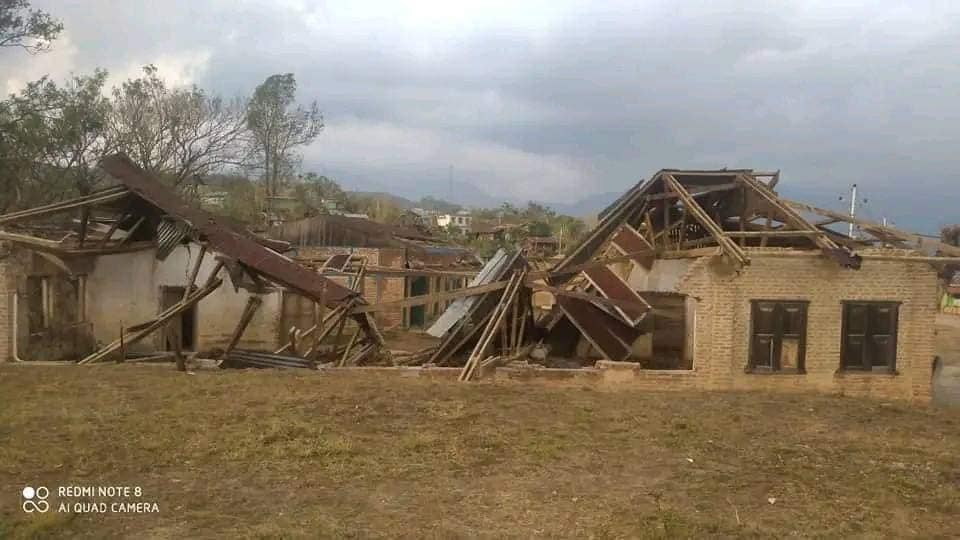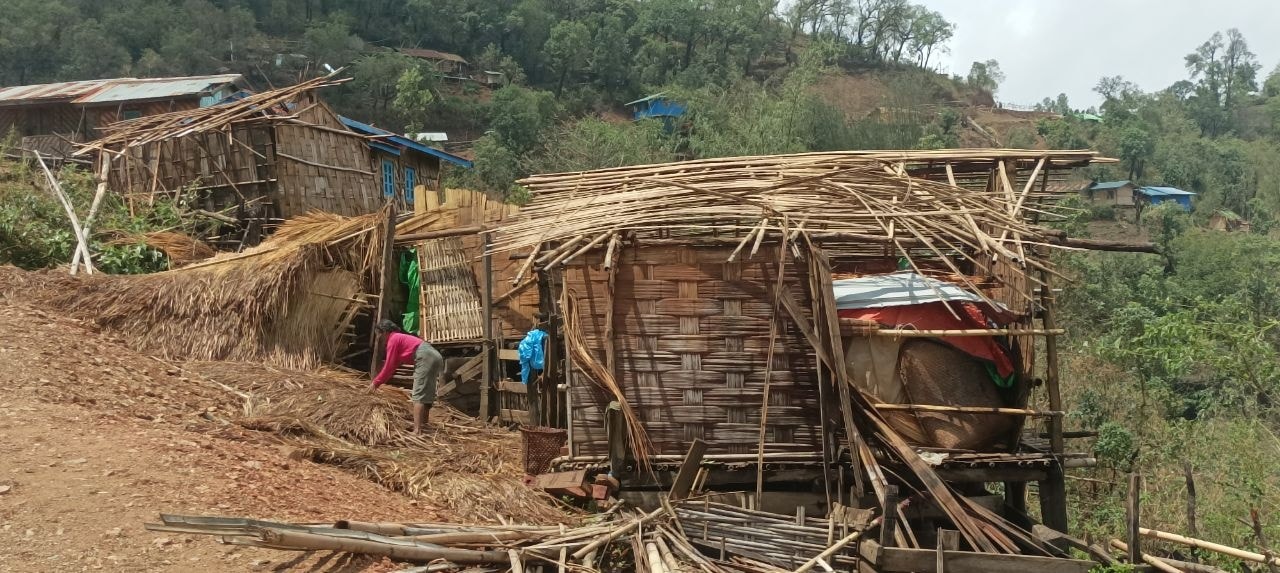More than a week after cyclone Mocha hit Myanmar, Chin State is yet to receive any relief aid from the outside world, leaving locals to struggle alone amid scenes of destruction second only to neighboring Rakhine.
Around 2,500 buildings were either destroyed or damaged by the cyclone in Chin State, according to an update on Monday morning.
Matupi and Mindat townships were hit hardest by the storm, which tore through displacement camps and damaged hundreds of grain silos. Locals are in urgent need of food and medical supplies as well as tarpaulin sheets and other building materials, according to local resistance authorities.

Around 600 houses and other buildings were damaged in Mindat. The border of Paletwa, where the regime has cut off phone and internet access, and Matupi suffered serious impacts, with 112 silos destroyed, said Ko Yaw Marn, spokesman of Mindat Township People’s Authority.
Three displacement camps were hit by the cyclone in Matupi, but no relief aid has reached the area.
May 18 editions of junta-controlled newspapers claimed that only 129 houses and a few monasteries, schools, clinics and government offices were damaged in Chin State. Junta boss Min Aung Hlaing has assigned Lieutenant-General Min Naing and three brigadier-generals to lead relief and recovery operations in Haka, Matupi, Paletwa and Tedim townships.
Junta media also stated that the regime had provided relief supplies for 170 households in Matupi Township and Lailinpi town. But this is a tiny effort compared with the huge amount of humanitarian aid needed by local people.
Chin State is among the least developed areas in Myanmar and suffers from poor transportation infrastructure. Even before Cyclone Mocha, nearly 100,000 people had fled fighting between junta forces and resistance groups and were sheltering in displacement camps. The cyclone was another terrible blow to the local population and worsened the humanitarian crisis.
The UN Office for Coordination of Humanitarian Affairs (UNOCHA) estimates that around 150,000 people were affected by the cyclone in Chin State and other areas of northwestern Myanmar. Cyclone victims urgently need shelter, drinking water, food, fuel and basic healthcare services, it said.
Some 500 people have been left homeless in Chin State alone, and around 50,000 people were affected by the storm, the UN agency said on May 18.
Yet despite UN statements about the devastation and urgent humanitarian needs in Chin State, no international organizations are providing help on the ground, said local civil society organizations.
Salai Issac Khen, spokesman of the Interim Chin National Consultative Council, said: “[Civilian] authorities are distributing supplies provided by the National Unity Government in respective townships. But those supplies are nothing considering that Chin State has fought the defensive war for the past two years, and 20 percent of the state’s population of 500,000 people have been displaced by the fighting. There is a need to help Chin State too.”
Fighting continues in storm-hit northwest Myanmar including Chin State, where challenges faced by humanitarian agencies include disrupted communications, travel restrictions, limited access and roadblocks, said UNOCHA-Myanmar.
All areas of Chin State except Paletwa Township have been under martial law for months as the junta conducts large-scale attacks in a desperate bid to reestablish control. It has also imposed restrictions on travel and supplies of food and other commodities, as well as cutting communications in the state.
The regime carried out airstrikes on villages in Mindat Township in the cyclone’s aftermath on May 15 and 17. Some 300 junta troops were also deployed in neighboring Kyaukhtu, making fresh clashes likely, said Ko Yaw Marn, spokesman of Mindat Township People’s Authority.
Local resistance forces suspect the regime will use clean-up operations as an excuse to send in troops to occupy areas currently controlled by Chin Defense Forces (CDF).
“[The regime] can negotiate with us to help people. We won’t allow them to enter our areas without our permission,” said Ko Yaw Marn.
Matupi CDF said it would not allow any group including those representing the regime to enter its territory without permission.

Local resistance groups are caught in a dilemma, said Salai Issac Khen of the Interim Chin National Consultative Council. Their image will be marred if they fight junta troops entering Chin State on the pretext of relief operations; but if they open the roads, it will allow the regime to retake control of the area easily while claiming that local resistance forces now accept the Myanmar military.
Local organizations have called on international aid agencies to deliver relief supplies through the civilian National Unity Government or local people’s authorities.
“If they hand over [supplies] to the regime, it will only deliver some of them in the towns for show,” warned Mindat Authority’s Ko Yaw Marn.
“It would not supply rural villages. During the Covid-19 pandemic, it delivered [international] supplies only to towns and kept the rest. [Donors] can provide supplies [for cyclone victims in Chin] through India and Bangladesh. There are many routes the regime can’t control.”

















